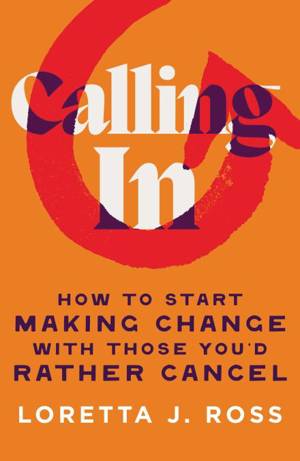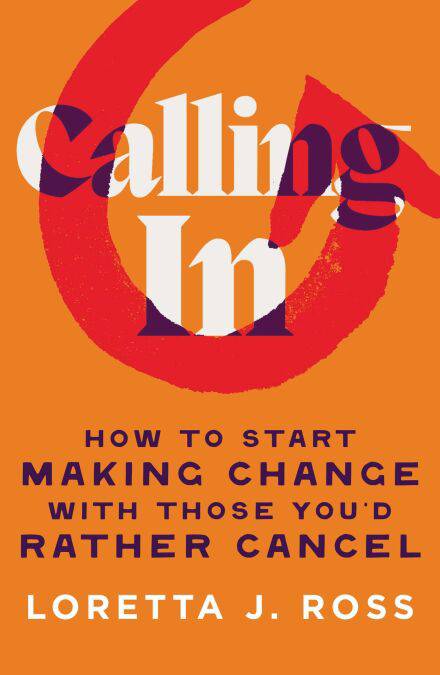
- Retrait gratuit dans votre magasin Club
- 7.000.000 titres dans notre catalogue
- Payer en toute sécurité
- Toujours un magasin près de chez vous
- Retrait gratuit dans votre magasin Club
- 7.000.0000 titres dans notre catalogue
- Payer en toute sécurité
- Toujours un magasin près de chez vous
Calling In EBOOK
How to Start Making Change with Those You'd Rather Cancel
Loretta J Ross
Ebook | Anglais
16,76 €
+ 16 points
Format
Description
From a pioneering Black feminist and MacArthur “Genius” Fellow, this urgent and exhilarating memoir-manifesto-handbook provides bold, practical new ways to transform conflicts into connections, even with those we’re tempted to walk away from.
In 1979, Loretta Ross was a single mother in Washington who’d had to drop out of Howard University. She was working at the DC Rape Crisis Center when the organization got a letter from a man in prison saying he wanted to learn how to not be a rapist anymore. At first, she was furious. As a survivor of sexual violence, she wanted to write back pouring out her rage. Instead, she made a different choice, a choice to reject the response her trauma was pushing her towards. This choice would set her on the path towards developing a framework that would come to guide her whole career: Rather than calling people out, try to call even your unlikeliest allies in. Hold them accountable—but with love.
Calling In is at once a handbook, a manifesto, and a memoir—because the power of Loretta Ross’s message comes from who she is and what she’s lived through. She’s a Black woman who’s deprogrammed white supremacists, and a survivor who’s taught convicted rapists the principles of feminism. With stories from her five remarkable decades in activism, she vividly illustrates why calling people in—inviting them into conversation instead of conflict and focusing on your shared values over a desire for punishment—is the more strategic choice if you want to make real change. And she shows you how to do so, whether in the workplace, on a college campus, or in your living room.
Courageous, awe-inspiring, and blisteringly authentic, Calling In is a “masterclass in constructive confrontation” (Adam Grant) and a practical new solution from one of our country’s most extraordinary change-makers—one anyone can learn to use to transform frustrating and divisive conflicts that stand in the way of real connection with the people in your life.
In 1979, Loretta Ross was a single mother in Washington who’d had to drop out of Howard University. She was working at the DC Rape Crisis Center when the organization got a letter from a man in prison saying he wanted to learn how to not be a rapist anymore. At first, she was furious. As a survivor of sexual violence, she wanted to write back pouring out her rage. Instead, she made a different choice, a choice to reject the response her trauma was pushing her towards. This choice would set her on the path towards developing a framework that would come to guide her whole career: Rather than calling people out, try to call even your unlikeliest allies in. Hold them accountable—but with love.
Calling In is at once a handbook, a manifesto, and a memoir—because the power of Loretta Ross’s message comes from who she is and what she’s lived through. She’s a Black woman who’s deprogrammed white supremacists, and a survivor who’s taught convicted rapists the principles of feminism. With stories from her five remarkable decades in activism, she vividly illustrates why calling people in—inviting them into conversation instead of conflict and focusing on your shared values over a desire for punishment—is the more strategic choice if you want to make real change. And she shows you how to do so, whether in the workplace, on a college campus, or in your living room.
Courageous, awe-inspiring, and blisteringly authentic, Calling In is a “masterclass in constructive confrontation” (Adam Grant) and a practical new solution from one of our country’s most extraordinary change-makers—one anyone can learn to use to transform frustrating and divisive conflicts that stand in the way of real connection with the people in your life.
Spécifications
Parties prenantes
- Auteur(s) :
- Editeur:
Contenu
- Nombre de pages :
- 288
- Langue:
- Anglais
Caractéristiques
- EAN:
- 9781982190811
- Date de parution :
- 03-02-25
- Format:
- Ebook
- Protection digitale:
- Adobe DRM
- Format numérique:
- ePub

Les avis
Nous publions uniquement les avis qui respectent les conditions requises. Consultez nos conditions pour les avis.






